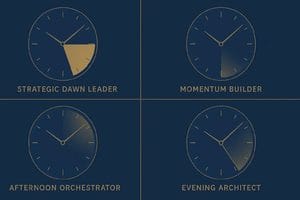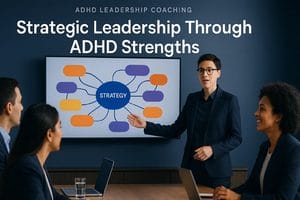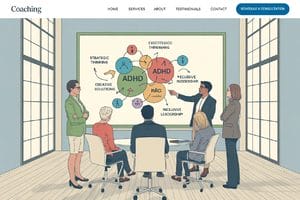TL;DR; Individual coaching excels at personalized goal achievement and deep behavioral change for ADHD executives, while group coaching provides peer learning, cost-effectiveness, and valuable community support. The optimal choice depends on your privacy needs, learning style, specific goals, and readiness for peer interaction. Many successful ADHD leaders benefit from combining both approaches strategically.
Two years ago, I had an executive call me in distress. He’d just dropped out of a highly-regarded leadership development program because, despite the excellent content and skilled facilitators, he found himself completely overwhelmed by the group dynamics. “I spent more energy managing my ADHD in that group than I did actually learning,” he told me. “I was constantly worried about talking too much, fidgeting, or losing track of conversations. I felt like I was performing being neurotypical instead of actually developing as a leader.”
Six months later, after we’d done some individual coaching work together, he reached out again. This time, he wanted to join a small group coaching cohort I was running specifically for neurodivergent executives. His experience this time was transformational. “The difference,” he reflected, “wasn’t just that the group understood ADHD. It was that I understood myself well enough to show up authentically and use the group energy to accelerate my growth rather than mask my challenges.”
This executive’s journey illustrates something crucial about group versus individual coaching for ADHD leaders: it’s not that one format is universally better, but that timing, self-awareness, and group composition can make the difference between coaching that feels overwhelming and coaching that feels empowering.
The Research Foundation: What We Know About Coaching Formats
Understanding the evidence base for different coaching approaches helps ADHD executives make informed decisions about their development investment. Research from the University of Salzburg comparing individual coaching, group training, and self-coaching found that individual coaching was superior in helping participants achieve personal goals and created higher levels of satisfaction, while group training was more effective at promoting knowledge acquisition.
The study revealed that individual coaching facilitated greater autonomy support and intrinsic motivation, leading to better goal attainment. However, group training proved more cost-effective for systematic skill building and knowledge transfer. For ADHD executives, these findings suggest that the optimal choice depends on whether your primary need is personalized behavior change or foundational skill development.
Additional research on group interventions for ADHD shows that while both individual and group approaches can be effective, group psychotherapy demonstrated superior long-term outcomes compared to individual clinical management after one year. This suggests that group approaches may provide unique benefits for sustainable change, particularly when peer support and community connection are important factors.
Research on peer inclusion interventions indicates that peer involvement can enhance learning opportunities and skill practice for individuals with ADHD, as participants facilitate each other’s development. However, the effectiveness depends significantly on group composition and facilitation quality, highlighting the importance of ADHD-informed group design.
Individual Coaching: The Power of Personalized Development
Individual ADHD coaching provides unique advantages that align particularly well with the personalized needs of neurodivergent executives who require customized approaches to leadership development.
Deep Customization and Privacy
Individual coaching allows for complete customization of content, pacing, and methodology to match your specific ADHD profile and executive challenges. Understanding your unique ADHD patterns becomes the foundation for developing strategies that work with rather than against your neurodivergent traits.
The privacy of individual coaching enables discussion of sensitive topics that ADHD executives often need to address but may hesitate to share in group settings. This includes workplace disclosure decisions, legal rights and accommodations, performance challenges, or family dynamics that impact professional effectiveness.
Individual sessions allow for real-time adjustment based on your attention patterns, energy levels, and emotional state during each conversation. If you’re having a particularly scattered day, the session can focus on grounding and organization. If you’re hyperfocused on a strategic challenge, the entire session can dive deep into that single issue without needing to consider group needs or time constraints.
Intensive Goal Achievement and Behavior Change
Individual coaching excels at facilitating the kind of deep, sustained behavior change that ADHD executives often need for breakthrough leadership development. Research confirms that individual coaching is superior for personal goal attainment compared to group formats.
The intensive, personalized attention allows for sophisticated work on emotional regulation and leadership presence that requires nuanced feedback and gradual skill building. Complex challenges like executive presence, strategic communication, or advanced leadership strategies often benefit from the sustained focus and customized practice opportunities that individual coaching provides.
Individual coaching also enables the development of highly personalized systems for productivity and organization that match your specific work style, technology preferences, and organizational context. These customized approaches often prove more sustainable than generic group recommendations.
Flexible Pacing and Attention Management
ADHD executives often struggle with the fixed pacing and attention demands of group settings. Individual coaching accommodates variable attention patterns, allowing sessions to follow your natural rhythms rather than forcing adherence to group schedules and attention spans.
Sessions can be shorter and more frequent when that works better for your attention pattern, or longer and less frequent when you benefit from deep-dive conversations. The flexibility extends to session format choices, technology integration, and the ability to pause, repeat, or accelerate based on your comprehension and processing needs.
Accelerated Trust and Vulnerability
The one-on-one relationship often enables faster development of trust and psychological safety, which can be crucial for ADHD executives who may have had negative experiences in group settings where their neurodivergent traits were misunderstood or criticized.
This accelerated trust-building allows for more rapid movement into vulnerable territory where significant growth often occurs. Issues like imposter syndrome, executive presence concerns, or the intersection of ADHD traits with leadership challenges can be addressed more quickly when there’s no concern about group judgment or peer comparison.
Group Coaching: The Community Advantage
Group coaching offers distinct benefits that can be particularly valuable for ADHD executives who are ready to leverage peer learning and community support for their development.
Peer Learning and Perspective Sharing
Group coaching provides exposure to diverse approaches, strategies, and perspectives that individual coaching cannot match. Research on peer support in ADHD management shows that peer interactions offer practical insights that complement clinical advice, leading to more comprehensive ADHD management approaches.
ADHD executives in group settings often discover solutions and strategies they would never have considered independently. The creative problem-solving that emerges from multiple ADHD brains working on similar challenges can generate breakthrough insights that accelerate everyone’s development.
Observing how other successful executives navigate similar ADHD-related challenges provides models and inspiration that can be particularly powerful for leaders who may feel isolated in their neurodivergence. Seeing others thrive with similar brain patterns reduces shame and increases possibilities for authentic leadership development.
Cost-Effectiveness and Accessibility
Group coaching typically costs significantly less per participant than individual coaching, making high-quality ADHD-informed executive development more accessible to broader populations. Research confirms that group training is more cost-effective for systematic skill building.
Organizations can provide group coaching to larger numbers of employees, creating a more comprehensive approach to supporting neurodivergent leaders. This scalability makes it possible to create neuroinclusive leadership cultures rather than supporting individual leaders in isolation.
The cost-effectiveness also enables longer-term engagements or more frequent sessions within the same budget, which can benefit ADHD executives who often need sustained support for lasting behavior change.
Accountability and Motivation Through Community
Research highlights the role of accountability in ADHD management, showing that peer support creates natural accountability structures that help individuals support their executive function challenges and treatment compliance.
Group members encourage each other to stay committed to development goals, creating multiple sources of accountability rather than relying solely on the coach-client relationship. This distributed accountability can be particularly valuable for ADHD executives who struggle with follow-through on individual commitments.
The motivation that comes from not wanting to let peers down often proves stronger than self-directed motivation alone. Group members celebrate each other’s successes and provide encouragement during challenging periods, creating a supportive community that extends beyond the coaching sessions themselves.
Reduced Isolation and Normalization
Many ADHD executives experience professional isolation, feeling like they’re the only leader struggling with attention, organization, or emotional regulation challenges. Group coaching provides immediate evidence that successful leaders can have ADHD and thrive professionally.
Virtual peer support groups for adults with ADHD offer safe, nonjudgmental environments where participants can share experiences and discover their strengths. This normalization reduces shame and creates space for authentic leadership development.
The community aspect helps address the masking fatigue that many ADHD executives experience by providing a professional context where neurodivergent traits can be discussed openly and leveraged strategically rather than hidden or compensated for.
When Individual Coaching Is Optimal
Certain circumstances and goals particularly favor individual coaching approaches for ADHD executives seeking development support.
Complex or Sensitive Development Needs
Executive-level challenges often involve confidential information, strategic decisions, or interpersonal dynamics that cannot be discussed appropriately in group settings. Issues like board relationships, succession planning, or significant organizational conflicts require the privacy and focused attention that individual coaching provides.
ADHD executives dealing with performance concerns, career transitions, or significant workplace accommodation needs often benefit from the confidential space to work through these challenges without peer observation or potential judgment.
Workplace disclosure strategies and navigating misconceptions about ADHD are highly personal decisions that benefit from individualized exploration rather than group discussion.
Intensive Behavior Change Requirements
When ADHD executives need to make significant changes to deeply ingrained patterns or develop sophisticated new capabilities, the intensive focus of individual coaching often proves necessary. Complex skills like strategic thinking, executive presence, or advanced emotional regulation require sustained, personalized practice and feedback.
Executives who have tried group approaches previously without achieving desired changes may need the intensive, customized attention that individual coaching provides to break through persistent patterns or develop capabilities that don’t emerge through peer learning alone.
Severe Attention or Social Challenges
Some ADHD executives struggle significantly with group dynamics, finding the social demands, attention management, and communication patterns of group settings overwhelming rather than supportive. These individuals may need individual coaching to develop foundational skills before they can benefit from group experiences.
Executives with significant social anxiety, rejection sensitivity, or previous negative group experiences may require the safety and control of individual coaching to build confidence and skills before engaging in peer learning environments.
Urgent Timeline or Specific Outcomes
When executives face urgent leadership challenges, promotion opportunities, or organizational crises, the focused efficiency of individual coaching often provides faster results than group processes that require consensus building and shared attention.
Specific, measurable outcomes like improving presentation skills, developing conflict resolution capabilities, or mastering new organizational systems often benefit from the concentrated focus and customized practice opportunities that individual coaching provides.
When Group Coaching Excels
Group coaching becomes particularly valuable under specific circumstances that align with ADHD executive development needs and organizational goals.
Skill Building and Knowledge Acquisition
Research confirms that group training is more effective than individual coaching for systematic knowledge acquisition and foundational skill building. ADHD executives who need to develop core leadership competencies, learn new frameworks, or acquire technical skills often benefit from the structured learning environment that groups provide.
Group coaching excels when the development goals involve learning content that applies broadly across participants, such as communication strategies, time management systems, or leadership frameworks that can be adapted to individual contexts.
Foundational productivity strategies and organizational systems often transfer well in group settings where participants can learn from each other’s adaptations and variations.
Peer Learning and Network Building
ADHD executives who value learning from others and building professional networks often thrive in group coaching environments. The exposure to diverse approaches, industries, and leadership challenges provides perspectives that individual coaching cannot match.
Group participants often develop ongoing professional relationships that extend beyond the coaching engagement, creating networks of neurodivergent leaders who can support each other’s continued development.
The collaborative problem-solving that emerges in well-facilitated groups can generate innovative solutions that benefit all participants while building relationships and mutual support systems.
Community and Belonging Needs
Executives who have felt isolated in their ADHD experience often find significant value in connecting with other successful leaders who share similar neurodivergent traits. The sense of belonging and normalized identity can be transformational for leaders who have spent years masking or feeling different.
Research on peer support effectiveness shows that group interactions provide unique benefits including understanding, acceptance, and reduced isolation that individual relationships cannot fully replicate.
The community aspect becomes particularly valuable for executives who want to contribute to broader cultural change around neurodiversity in leadership rather than focusing solely on individual adaptation.
Budget and Accessibility Considerations
Organizations with limited coaching budgets can often provide group coaching to more executives than would be possible with individual engagements. This broader accessibility can create more comprehensive support for neurodivergent talent development.
Individual executives who cannot afford extensive individual coaching may find group options more financially accessible while still receiving high-quality, ADHD-informed development support.
Hybrid Approaches: Getting the Best of Both Worlds
Rather than viewing individual and group coaching as mutually exclusive, many successful ADHD executives benefit from strategic combinations that leverage the unique advantages of each format.
Sequential Development Pathways
A common effective approach involves starting with individual coaching to build foundation skills, self-awareness, and confidence before transitioning to group coaching for peer learning and community building. This sequence allows executives to address personal challenges privately while building capacity to engage authentically in group settings.
Alternatively, some executives benefit from group coaching first to normalize their ADHD experience and learn foundational strategies, followed by individual coaching to address specific, personalized development goals that emerged from the group experience.
The measurement approaches we use help determine optimal timing for transitions between formats based on actual progress patterns rather than predetermined schedules.
Concurrent Complementary Coaching
Some executives engage in both individual and group coaching simultaneously, using individual sessions for sensitive or complex issues while leveraging group sessions for peer learning and accountability. This approach maximizes the benefits of both formats while allowing for immediate application of group insights through individual coaching support.
Organizations sometimes provide individual coaching for senior executives while offering group coaching for broader leadership populations, creating multiple touchpoints and development pathways that serve different needs and career levels.
Project-Based Format Selection
Different development goals may call for different coaching formats. Leadership presence and executive communication might benefit from individual coaching, while strategic planning and innovation capabilities might develop more effectively in group environments where diverse perspectives enhance thinking.
Work-life integration strategies might be addressed individually due to personal nature, while organizational change leadership might benefit from group collaboration and peer learning.
Organizational Considerations for Format Selection
Organizations investing in ADHD executive coaching need to consider how format decisions align with broader talent development strategies and cultural goals.
Creating Neuroinclusive Development Cultures
Offering both individual and group coaching options signals organizational commitment to supporting diverse development needs and learning styles. This flexibility demonstrates understanding that neurodivergent leaders may require different approaches to reach their full potential.
Group coaching can help create visible communities of successful neurodivergent leaders, contributing to broader neurodiversity inclusion efforts while individual coaching ensures that specific, sensitive needs are addressed appropriately.
Cost and Resource Optimization
Organizations can often serve more executives through group coaching while reserving individual coaching for specific situations like high-potential leaders, performance challenges, or senior executive development. This tiered approach maximizes resource impact while ensuring appropriate support levels.
Measuring coaching effectiveness across both formats helps organizations understand which approaches generate the best outcomes for different types of development goals and participant characteristics.
Integration with Broader Development Programs
Group coaching often integrates well with existing leadership development programs, adding ADHD-specific support to broader leadership curricula. Individual coaching can address specific accommodation needs or performance gaps that group programs may not fully address.
Understanding the complete coaching process helps organizations design comprehensive development pathways that may include both individual and group elements at different stages or for different purposes.
Making Your Decision: A Practical Framework
Choosing between group and individual coaching requires honest assessment of your current needs, readiness, and development goals.
Coaching Format Decision Matrix
Personal Readiness Assessment Consider your current comfort level with group dynamics and peer interaction. Are you ready to be authentic about your ADHD in a professional group setting, or do you need individual work first to build that confidence? Have you had positive or negative experiences with group learning in the past?
Assess your current stress levels and bandwidth. Group coaching requires energy for social interaction and attention management that may not be available during particularly challenging periods. Individual coaching offers more flexibility to adapt to your current capacity.
Development Goal Analysis Evaluate whether your primary goals involve personal behavior change (favoring individual coaching) or skill acquisition and peer learning (favoring group coaching). Complex, sensitive, or highly personalized challenges often benefit from individual attention, while foundational skills and knowledge building may develop effectively in group settings.
Consider the timeline and urgency of your development needs. Individual coaching typically provides faster results for specific outcomes, while group coaching may offer more sustainable long-term community support.
Privacy and Confidentiality Needs Determine what level of privacy you require for effective development conversations. Issues involving organizational politics, performance concerns, or personal challenges may require individual coaching settings.
Consider your comfort level with peer accountability and feedback. Some executives thrive on group accountability while others find it distracting or stressful.
Learning Style and Preferences Reflect on how you learn most effectively. Do you benefit from diverse perspectives and collaborative problem-solving, or do you need focused, intensive attention to process and integrate new concepts?
Consider your attention patterns and energy management. Group settings require sustained attention and social energy that may be challenging during certain periods or times of day.
Budget and Accessibility Factors Evaluate your available resources for coaching investment. Group coaching typically offers more value per session while individual coaching provides more intensive, personalized attention.
Consider whether your organization provides coaching support and what formats are available through employer-sponsored programs.
The decision between group and individual coaching for ADHD executives isn’t about finding the universally “better” option – it’s about matching the coaching format to your unique combination of needs, readiness, goals, and circumstances at a particular point in your development journey.
Both formats offer distinct advantages that can significantly impact executive effectiveness when chosen and implemented thoughtfully. Individual coaching provides the deep customization and intensive focus that complex leadership challenges often require, while group coaching offers peer learning, community support, and cost-effectiveness that can accelerate development in different ways.
The most successful ADHD executives often utilize both approaches strategically, recognizing that their development needs may change over time and that different goals may benefit from different formats. Understanding your complete coaching options includes recognizing that format flexibility often serves neurodivergent leaders better than rigid adherence to any single approach.
Whether you choose individual coaching for its personalized intensity, group coaching for its community and cost benefits, or a hybrid approach that leverages both, the key is making an informed decision based on your actual needs rather than assumptions about what should work. The goal is sustainable leadership development that honors your neurodivergent traits while building the capabilities you need to excel in your executive role.
Frequently Asked Questions
Can I combine group and individual ADHD coaching for maximum benefit?
Absolutely! Many successful ADHD executives use hybrid approaches that leverage the unique benefits of both formats. You might start with individual coaching to build foundational self-awareness and confidence, then transition to group coaching for peer learning and community support. Alternatively, you could engage in both simultaneously – using individual sessions for sensitive or complex issues while benefiting from group accountability and diverse perspectives. The key is timing and intentional selection based on your current needs and development goals.
How do I know if I'm ready for group coaching as an ADHD executive?
Readiness for group coaching typically involves comfort with discussing your ADHD openly in professional settings, ability to manage attention and social energy in group environments, and willingness to both give and receive peer feedback. If you’ve addressed basic ADHD awareness and developed some foundational coping strategies, you’re likely ready to benefit from group dynamics. However, if you’re dealing with significant performance issues, major life transitions, or haven’t yet developed confidence in your ADHD identity, individual coaching might be more appropriate initially.
What if I'm concerned about privacy in group ADHD coaching settings?
Privacy concerns are legitimate and important to address before committing to group coaching. Look for groups with clear confidentiality agreements, experienced facilitators who manage group dynamics professionally, and participants who demonstrate mutual respect and discretion. You can start by observing a session or asking detailed questions about group norms and privacy protocols. Remember that you control what you share – group coaching doesn’t require disclosure of sensitive organizational or personal information to be beneficial.
Which format provides better ROI for ADHD executive development?
ROI depends on your specific goals and circumstances. Group coaching typically offers better cost-per-session value and can be highly effective for skill building, peer learning, and community support. Individual coaching provides more intensive, personalized attention that often leads to faster results for complex behavioral changes and sensitive development needs. Consider that group coaching may require less total investment while individual coaching may achieve specific outcomes more quickly. The best ROI comes from choosing the format that actually creates sustainable change for your particular development needs.
Ready to explore which coaching format aligns best with your ADHD executive development goals? The choice between group and individual coaching is deeply personal and depends on your unique combination of needs, readiness, and circumstances. I invite you to schedule a discovery conversation where we can assess your current situation, discuss your development priorities, and explore which format – or combination of formats – would best serve your leadership growth and success.
Schedule your complimentary consultation with Tandem Coaching Partners to discover the approach that maximizes your ADHD executive potential.
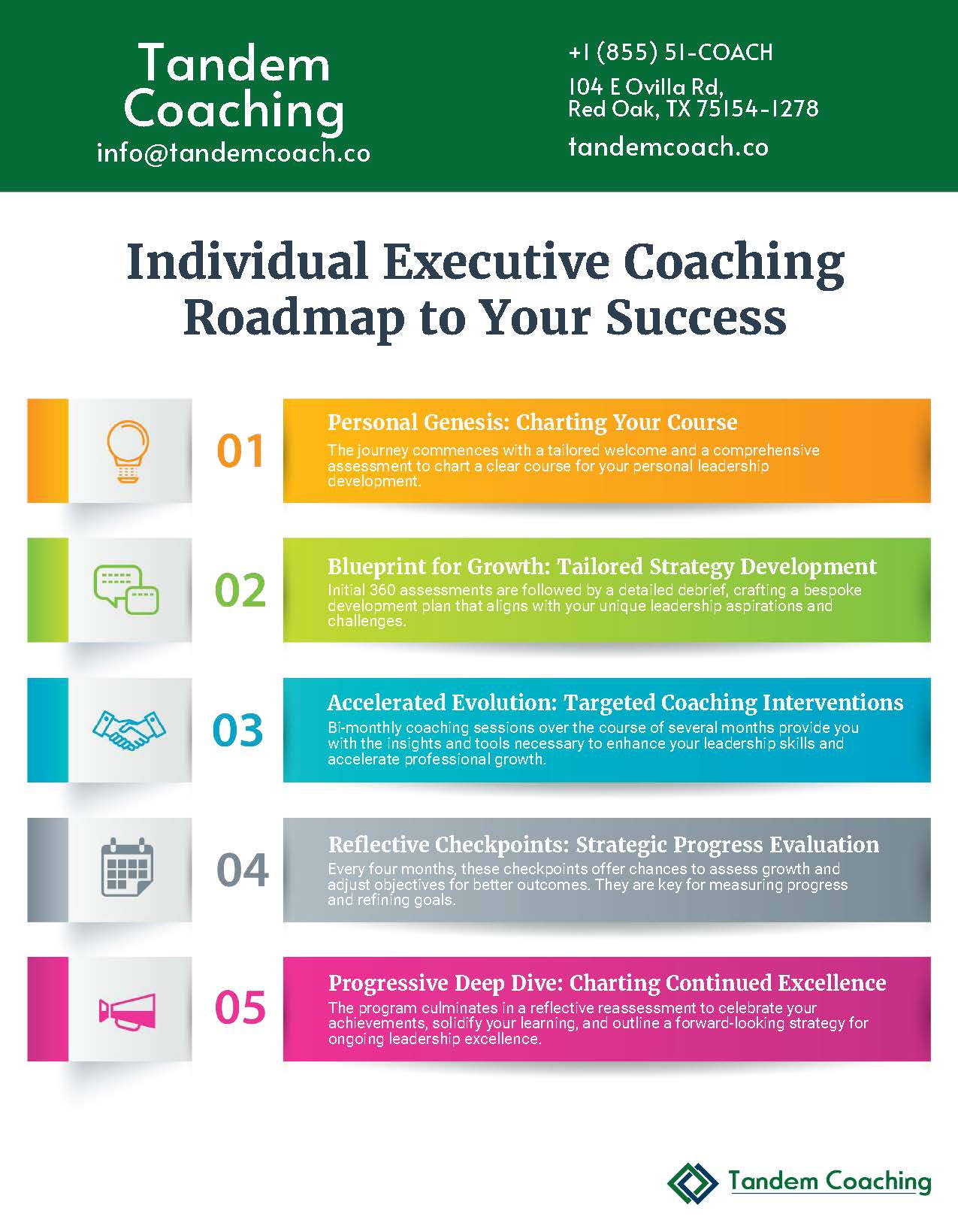

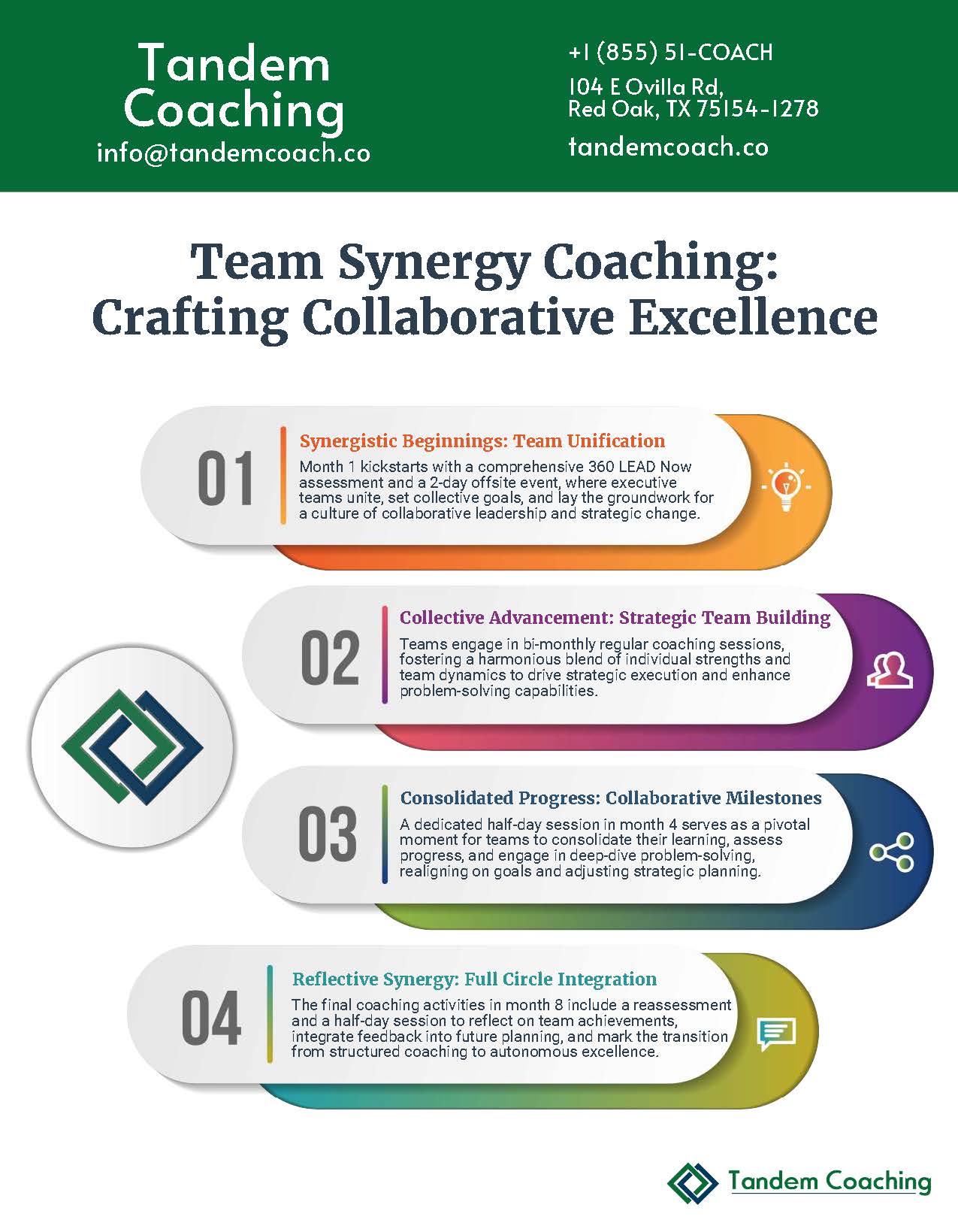
Boost Your Leadership Team Success!
Take your leadership team to the next level and achieve great results with our executive coaching.
Learn how our coaching and ASPIRE method can change things for you—get a free brochure to begin your journey.
About the Author
Cherie Silas, MCC
She has over 20 years of experience as a corporate leader and uses that background to partner with business executives and their leadership teams to identify and solve their most challenging people, process, and business problems in measurable ways.






